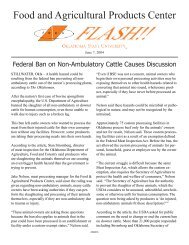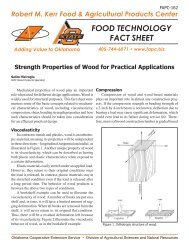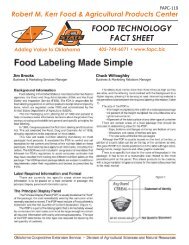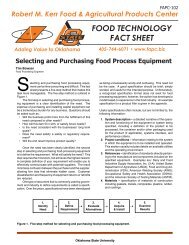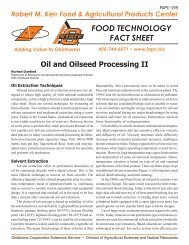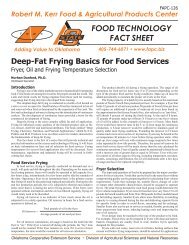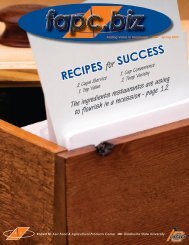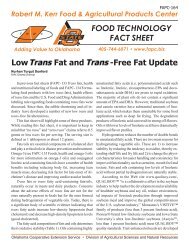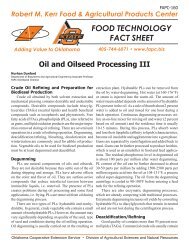Food Pathogens of Concern: Listeria monocytogenes
Food Pathogens of Concern: Listeria monocytogenes
Food Pathogens of Concern: Listeria monocytogenes
You also want an ePaper? Increase the reach of your titles
YUMPU automatically turns print PDFs into web optimized ePapers that Google loves.
ganism to be controlled during processing.<br />
A zero-tolerance policy was introduced in 1989<br />
by the <strong>Food</strong> Safety and Inspection Service, or FSIS,<br />
for RTE meat and poultry products. This means that<br />
processed meats are considered adulterated if any L.<br />
<strong>monocytogenes</strong> is present in these products. In 1999,<br />
FSIS established strategies and directives for controlling<br />
L. <strong>monocytogenes</strong> in RTE meat products. It has<br />
also been recommended that products must be labeled<br />
with statements such as ‘keep refrigerated or frozen.’<br />
Some manufacturers even put ‘cooking instructions’<br />
on labels <strong>of</strong> hotdogs that are considered fully-cooked<br />
RTE meat products. Still, the occurrence <strong>of</strong> L. <strong>monocytogenes</strong><br />
in common RTE foods may vary from 1 to 5<br />
percent.<br />
The National Advisory Committee on Microbiological<br />
Criteria for foods, or NACMCF, recommended<br />
implementing Hazard Analysis Critical Control Point<br />
system, or HACCP, and process control strategies. The<br />
system requires meat and poultry processors to identify<br />
critical control points where food contamination<br />
may be controlled and to take the necessary steps to<br />
prevent contamination.<br />
Most recently, through Directive 10,240.3 and<br />
the Final Rule for the control <strong>of</strong> L. <strong>monocytogenes</strong> on<br />
meat and poultry products, the USDA’s FSIS initiated<br />
the idea <strong>of</strong> ‘high or medium/low risk’ RTE meat<br />
product categories. They have also <strong>of</strong>fered incentives<br />
<strong>of</strong> less regulatory testing <strong>of</strong> products if processors can<br />
give evidence <strong>of</strong> using post-process lethality steps or<br />
antimicrobial ingredients to control <strong>Listeria</strong>.<br />
The FSIS identified three process categories: Alternative<br />
3, where sanitation in a processing environment<br />
was the main form <strong>of</strong> <strong>Listeria</strong> control; Alternative 2,<br />
where either a post-process lethality step or antimicrobial<br />
ingredients would control <strong>Listeria</strong>; and Alternative<br />
1 process category, where both post-process<br />
lethality measures and antimicrobial ingredients would<br />
be used. The incentive for industry is that the least<br />
involved Alternative 3 process carries the most FSIS<br />
testing; whereas, an Alternative 2 process category reduced<br />
risk by implementing one or another additional<br />
intervention and thereby, is <strong>of</strong>fered less regulatory<br />
testing. Alternative 1 requires that both post-process<br />
lethality and antimicrobial ingredients be employed,<br />
posing the least risk, and is rewarded with the least<br />
Oklahoma State University, in compliance with Title VI and VII <strong>of</strong> the Civil Rights Act <strong>of</strong> 1964, Executive Order 11246 as amended, Title IX <strong>of</strong> the Education Amendments <strong>of</strong> 1972, Americans with Disabilities<br />
Act <strong>of</strong> 1990, and other federal laws and regulations, does not discriminate on the basis <strong>of</strong> race, color, national origin, sex, age, religion, disability, or status as a veteran in any <strong>of</strong> its policies, practices or<br />
procedures. This includes but is not limited to admissions, employment, financial aid, and educational services.<br />
Issued in furtherance <strong>of</strong> Cooperative Extension work, acts <strong>of</strong> May 8 and June 30, 1914, in cooperation with the U.S. Department <strong>of</strong> Agriculture, Robert E. Whitson, Director <strong>of</strong> Cooperative Extension Service,<br />
Oklahoma State University, Stillwater, Oklahoma. This publication is printed and issued by Oklahoma State University as authorized by the Dean <strong>of</strong> the Division <strong>of</strong> Agricultural Sciences and Natural<br />
Resources and has been prepared and distributed at a cost <strong>of</strong> 74 cents per copy. 0710<br />
136-4<br />
regulatory testing. Of course, USDA-FSIS has regulatory<br />
oversight <strong>of</strong> the interventions used.<br />
Consumer<br />
To protect consumers against listeriosis, the two<br />
retail agencies, FDA and USDA-FSIS, have stressed<br />
the importance <strong>of</strong> proper food handling, food sanitation,<br />
refrigeration, and cooking procedures through the<br />
FDA’s educational ‘Fight Bac’ program. FDA monitors<br />
s<strong>of</strong>t cheeses, dairy products, and processed seafood<br />
products, and FSIS monitors processed meat and<br />
poultry products.<br />
State and local agencies are responsible for overseeing<br />
food handling practices <strong>of</strong> retail food establishments,<br />
such as restaurants, delis, and supermarkets.<br />
To educate the consumers and people at risk such as<br />
pregnant women, immunocompromised persons, and<br />
health pr<strong>of</strong>essionals, the agencies have prepared brochures<br />
and other educational materials.<br />
Individuals at high risk should avoid s<strong>of</strong>t cheeses,<br />
such as Mexican queso blanco, Feta, Brie, Camembert,<br />
and blue cheese; avoid handled perishable foods from<br />
the deli; and wash raw vegetables before consuming.<br />
Care should be taken to prevent cross contamination<br />
from raw meat to prepared meat. Avoid drinking unpasteurized<br />
milk and eating foods that contain unpasteurized<br />
milk.<br />
Further information on<br />
<strong>Listeria</strong> <strong>monocytogenes</strong>:<br />
FDA/CFSAN Bad Bug Book<br />
(<strong>Listeria</strong> <strong>monocytogenes</strong>)<br />
http://vm.cfsan.fda.gov/~mow/chap6.html<br />
USDA-FSIS <strong>Food</strong>borne Illness and Disease:<br />
<strong>Listeria</strong> <strong>monocytogenes</strong><br />
http://www.fsis.usda.gov/fact_sheets/listeria_<br />
<strong>monocytogenes</strong>/index.asp<br />
CDC Disease Information: Listeriosis<br />
http://www.cdc.gov/ncidod/dbmd/dideaseinfo/<br />
listeriosis_g.htm



